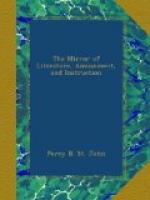“Very different from this quieter scene, was the one that presented itself, on my getting through the last street, and reaching the water-side. The comet itself seemed to have come to earth, and to be burning and waving in one’s face, the whole city being its countenance, and its hair flowing towards Whitehall in a volume of fiery smoke. The river was of a bloodish colour like the flame, and the sky over head was like the top of a pandemonium. From the Tower to St. Paul’s there was one mass of fire and devastation, the heat striking in your eyes, and the air being filled with burning sparkles, and with the cries of people flying, or removing goods on the river. Ever and anon distant houses fell in, with a sort of gigantic shuffling noise, very terrible. I saw a steeple give way, like some ghastly idol, its long white head toppling, and going sideways, as if it were drunk. A poor girl near me, who paced a few yards up and down, holding her sides as if with agony, turned and hid her eyes at this spectacle, crying out, ‘Oh, the poor people! oh the mothers and babies!’ She was one of the lowest of an unfortunate class of females. She thought, as I did, that there must be a dreadful loss of lives; but it was the most miraculous circumstance of that miraculous time, that the fire killed nobody, except some women and infirm persons with fright.
“I took boat, and got to Whitehall, where I found the King in a more serious and stirring humour than ever I saw him. Mr. Pepys, begging God to forgive him for having an appetite at such a crisis, and interrupting his laughter at the supper they gave him, with tears of pity and terror, had brought word to his Majesty that the whole city would be destroyed, if some of the houses were not blown up. The King accordingly not only dispatched myself and many others to assist, but went in person with his brother, and did a world of good. I never saw him look so grim, or say so many kind things. Wherever he went, he gave the people a new life, for they seemed dead with fright. Those who had not fled, (which they did by thousands into the fields where they slept all night,) seemed only to have been prevented from doing so, by not knowing what steps to take. The Lord Mayor, a very different one from his predecessor, who showed a great deal of courage during the plague, went about like a mad cook with his handkerchief, perspiring, and lamenting himself; and nobody would have taken the citizens for the same men who settled my court friends at the battle of Naseby. The court, however, for that matter, was as frightened as the city, with the exception of the King and one or two others; so terrible is a new face of danger, unless there is some peculiar reason for meeting it. The sight indeed of the interior of the burning city, was more perilous, though not so awful, as its appearance outside. Many streets consisted of nothing but avenues between heaps of roaring ruins; the sound of the fire being nothing less than that of hundreds




